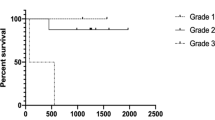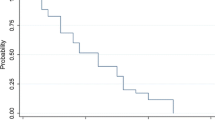Abstract
Hydroxyurea (HU), an orally administered chemotherapy, has become the de facto standard chemotherapeutic agent in patients with surgically and radiation refractory meningiomas based on a limited literature. A retrospective case series of 35 patients with recurrent WHO Grade 2 (n = 22) or 3 (n = 13) meningioma treated with HU following progression after surgery and radiotherapy was collated with primary study objectives of overall response rate, median and progression free survival (PFS) at 6-months. Thirty-five patients (25 women; 10 men: median age 63 years, range 34–86) with recurrent high-grade meningioma were treated with HU (1,000 mg/m2 orally divided twice per day; one cycle operationally defined as 4 weeks of daily HU). Patients had progressed radiographically after prior therapy with surgery (35/35) and radiotherapy (35/35: external beam radiotherapy 35/35; stereotactic radiotherapy 35/35). No patient received prior chemotherapy or targeted therapy before instituting HU. Patients received 0.5–7 cycles (median 2.0) of HU with modest toxicity (28.5% all grades and 8.5% grade 3+ anemia or fatigue). There were no radiographic responses, 43% of patients had stable disease and 57% manifested progressive disease at first evaluation. The overall PFS was 3.0% at 6 months (median PFS 2.0 months; 95% CI 1.6–2.4). The majority of patients (80%) following progression on HU were subsequently treated on an investigational trial. In this retrospective series, HU though well tolerated and convenient appeared to have very limited activity, raise questions of what constitutes effective salvage therapy and indicates an unmet need for alternative treatments for recurrent high-grade meningiomas.

Similar content being viewed by others
References
Norden AD, Drappatz J, Wen PY (2009) Advances in meningioma therapy. Curr Neurol Neurosci Rep 9(3):231–240
Sioka C, Kyritis AP (2009) Chemotherapy, hormonal therapy, and immunotherapy for recurrent meningiomas. J Neurooncol 92:1–6
Simon M, Bostrom JP, Hartmann C (2007) Molecular genetics of meningiomas: from basic research to potential clinical applications. Neurosurgery 60(5):787–798
McMullen KP, Stieber VW (2004) Meningioma: current treatment options and future directions. Curr Treat Options Oncol 5:499–509
Rockhill J, Mrugala M, Chamberlain MC (2007) Intracranial meningiomas: an overview of diagnosis and treatment. Neurosurg Focus 23:E1
Goldsmith B, McDermott MW (2006) Meningioma. Neurosurg Clin N Am 17:111–120
Chamberlain MC, Barnholtz-Sloan J (2011) Medical treatment of recurrent meningiomas. Expert Rev Neurother 11(10):1425–1432
Brem SS, Bierman PJ, Brem H et al (2011) Central nervous system cancers: clinical practice guidelines in oncology. J Natl Compr Canc Netw 9(4):352–400
Schrell UM, Ritting MG, Anders M et al (1997) Hydroxyurea for treatment of unresectable and recurrent meningiomas II. Decrease in the size of meningiomas in patients treated with hydroxyurea. J Neurosurg 86:840–844
Schrell UM, Ritting MG, Anders M et al (1997) Hydroxyurea for treatment of unresectable and recurrent meningiomas. I. Inhibition of primary human meningioma cells in culture and in meningioma transplants by induction of the apoptotic pathway. J Neurosurg 86(5):845–852
Newton HB, Slivka MA, Stevens C (2000) Hydroxyurea chemotherapy for unresectable or residual meningioma. J Neurooncol 49(2):165–170
Newton HB, Scott SR, Volpi C (2004) Hydroxyurea chemotherapy for meningiomas: enlarged cohort with extended follow-up. Br J Neurosurg 18:495–499
Mason WP, Gentili F, Macdonald DR, Hariharan S, Cruz CR, Abrey LE (2002) Stabilization of disease progression by hydroxyurea in patients with recurrent or unresectable meningioma. J Neurosurg 97:341–346
Rosenthal MA, Ashley DL, Cher L (2002) Treatment of high risk or recurrent meningiomas with hydroxyurea. J Clin Neurosci 9(2):156–158
Hahn BM, Schrell UMH, Sauer R et al (2005) Prolonged oral hydroxyurea and concurrent 3d-conformal radiation in patients with progressive or recurrent meningioma: results of a pilot study. J Neurooncol 74:157–165
Loven D, Hardoff R, Sever ZB et al (2004) Non-resectable slow-growing meningiomas treated by hydroxyurea. J Neurooncol 67:221–226
Nayak L, Iwamoto F, Kaley T (2011) Atypical and anaplastic meningioma treated with bevacizumab. Neurology 76:A96 (abstract P02.011)
Kaley TJ, Wen PY, Schiff D et al (2010) Phase II Trial of Sunitinib (SU011248) for recurrent meningioma. Neuro Oncol 12(s4):iv75–iv76
Grimm SA, Chamberlain MC, Chandler J et al (2011) A phase II trial of PTK787/ZK 222584 (PTK787) in recurrent high-grade meningioma. Proceeding American Society of Clinical Oncology. Chicago, IL. May 2010. J Clin Oncol 29(15S):151s (abstract #2046)
Wen PY, Yung WK, Lamborn KR et al (2006) Phase I/II study of imatinib mesylate for recurrent malignant gliomas: North American Brain Tumor Consortium Study 99–08. Clin Cancer Res 12:4899–4907
Wen PY, Yung WK, Lamborn KR et al (2009) Phase II study of imatinib methylate (Gleevec) for recurrent meningiomas (North American Brain Tumor Consortium study 01–08). Neuro Oncol 11(6):853–860
Norden AD, Raizer JJ, Abrey LE et al (2010) Phase II trials of erlotinib or gefitinib in patients with recurrent meningioma. J Neurooncol 96(2):211–217
Hammond S, Norden A, Drappatz J et al (2011) Phase II study of monthly Pasireotide (SOM230C) for recurrent or progressive meningioma. J Clin Oncol 29(15S):150s (abstract #2040)
Chamberlain MC, Glantz MJ, Fadul CE (2007) Recurrent meningioma: salvage therapy with sandostatin. Neurology 69:969–973
Chamberlain MC, Glantz MJ (2008) α-Interferon for recurrent WHO grade I intracranial meningiomas. Cancer 113:2146–2151
Chamberlain MC, Johnston SK (2011) Hydroxyurea for recurrent surgery and radiation refractory WHO Grade 1 meningioma. J Neurooncol 104(3):765–771
Grunberg SM, Rankin C, Townsend J et al (2001) Phase II double-blind randomized placebo-controlled study of mifepristone (RU) for the treatment of unresectable meningioma. Proc Am Soc Clin Oncol 20:56a (#222)
Chamberlain MC (1996) Malignant meningiomas: adjunct combined modality therapy. J Neurosurg 84:733–736
Macdonald DR, Cascino TL, Schold SC, Cairncross JG (1990) Response criteria for phase 2 studies of supratentorial malignant glioma. J Clin Oncol 8:1277–1280
Wen P, Macdonald DR, Reardon DA et al (2009) Proposal for an updated response assessment criteria for high-grade gliomas: radiology assessment for neuro-oncology: working group. J Clin Oncol 28:1963–1972
Conflict of interest
The author reports no conflict of interest or financial disclosure related to this article.
Author information
Authors and Affiliations
Corresponding author
Rights and permissions
About this article
Cite this article
Chamberlain, M.C. Hydroxyurea for recurrent surgery and radiation refractory high-grade meningioma. J Neurooncol 107, 315–321 (2012). https://doi.org/10.1007/s11060-011-0741-z
Received:
Accepted:
Published:
Issue Date:
DOI: https://doi.org/10.1007/s11060-011-0741-z




